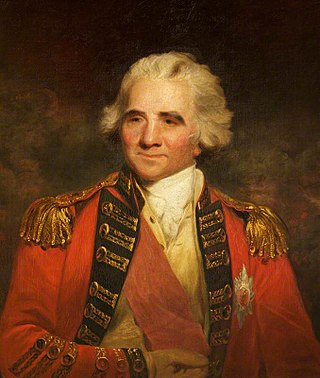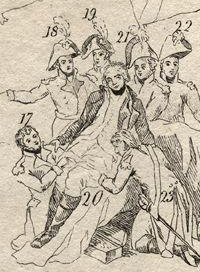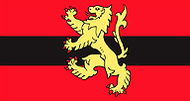Related Research Articles

Lieutenant-General Sir Ralph Abercromby, was a Scottish soldier and politician. He rose to the rank of lieutenant-general in the British Army, was appointed Governor of Trinidad, served as Commander-in-Chief, Ireland, and was noted for his services during the French Revolutionary Wars, ultimately in the Egyptian campaign. His strategies are ranked amongst the most daring and brilliant exploits of the British army.

Earl of Rosslyn is a title in the Peerage of the United Kingdom. It was created in 1801 for Alexander Wedderburn, 1st Baron Loughborough, Lord Chancellor from 1793 to 1801, with special remainder to his nephew Sir James St Clair-Erskine, as Wedderburn had no surviving issue of his own. Wedderburn had already been created Baron Loughborough, of Loughborough in the County of Leicester, in the Peerage of Great Britain in 1780, with normal remainder to the heirs male of his body, and Baron Loughborough, of Loughborough in the County of Surrey, in the Peerage of Great Britain in 1795, with the same remainder as the earldom. The 1780 barony became extinct upon his death, but the 1795 barony and the earldom passed, by the special remainder, to his nephew, who thus became the second Earl of Rosslyn. The second Earl was a Lieutenant-General in the Army and also held political office as Lord Privy Seal and Lord President of the Council.

Earl Cathcart is a title in the Peerage of the United Kingdom.

Baron Abercromby, of Aboukir and Tullibody, was a title in the peerage of the United Kingdom. It was created on 28 May 1801 for Mary, Lady Abercromby, in honour of her husband, the noted military commander Lieutenant-General Sir Ralph Abercromby, who won the Battle of Aboukir in 1801 and later died from wounds at the Battle of Alexandria. The latter was the grandson of Alexander Abercromby, member of the Scottish Parliament for Clackmannanshire from 1703 to 1707, younger son of Sir Alexander Abercromby, 1st Baronet, of Birkenbog.

David William Murray, 3rd Earl of Mansfield, KT was a British army officer and peer, who served as Lord Lieutenant of Clackmannanshire from 1803 until his death.
Commander-in-Chief, Ireland, was title of the commander of the British forces in Ireland before 1922. Until the Act of Union in 1800, the position involved command of the distinct Irish Army of the Kingdom of Ireland.
This is a list of people who served as Lord Lieutenant of Stirlingshire in Scotland. The office was abolished in 1975, and replaced with the Lord Lieutenant of Stirling and Falkirk.
General James Alexander St Clair-Erskine, 3rd Earl of Rosslyn PC, DL, styled Lord Loughborough from 1805 to 1837, was a Scottish soldier and Tory politician. A General in the British Army, he also held political office as Master of the Buckhounds between 1841 and 1846 and again in 1852 and as Under-Secretary of State for War in 1859.

Baron Erskine, of Restormel Castle in the County of Cornwall, is a title in the Peerage of the United Kingdom, since 1960 a subsidiary title of the earldom of Buchan. It was created on 10 February 1806 for the Honourable Thomas Erskine on his appointment as Lord High Chancellor of Great Britain, a post he held until the following year. He was the third and youngest son of Henry Erskine, 10th Earl of Buchan. Lord Erskine was succeeded by his eldest son, the second Baron. He was a diplomat. His two eldest sons, the third and fourth Barons, succeeded successively. The latter was succeeded by his son, the fifth Baron. He was a Deputy Lieutenant of Northamptonshire. His grandson, the seventh Baron, succeeded in the earldom of Buchan in 1960 on the death of his kinsman, the fifteenth Earl. The two titles have remained united since.

The Lord High Commissioner to the General Assembly of the Church of Scotland is the monarch's personal representative to the General Assembly of the Church of Scotland, reflecting the Church's role as the national church of Scotland and the monarch's role as protector and member of that Church. In its history, the office holder has been the personal representatives to all Scottish monarchs, and later British monarchs, following the Union of the Crowns.

William David Murray, 4th Earl of Mansfield, 3rd Earl of Mansfield, KT, DL was a British Conservative politician. Known as Lord Stormont from 1806-1840.
George Abercromby, 2nd Baron Abercromby was a Scottish lawyer, politician and peer. The eldest son of Lt.-Gen. Sir Ralph Abercromby and Mary Abercromby, 1st Baroness Abercromby, he became, like his grandfather, a lawyer, and was called to the bar in 1794. On his death in 1843 he was succeeded in the barony by his son.

Lieutenant-General Sir John Abercromby GCB was a British Army officer and Member of Parliament (MP) for Clackmannanshire from 1815 to 1817.
George Ralph Campbell Abercromby, 3rd Baron Abercromby was a Scottish soldier, politician and peer. The son of George Abercromby, 2nd Baron Abercromby and Montague Dundas, on his death in 1852 he was succeeded in the barony by his eldest son.

Scottish Command or Army Headquarters Scotland is a command of the British Army.
General George James Ludlow, 3rd Earl Ludlow GCB, was a British peer and soldier.
The Sheriff of Stirling was historically the office responsible for enforcing law and order in Stirling, Scotland and bringing criminals to justice. Prior to 1748 most sheriffdoms were held on a hereditary basis. From that date, following the Jacobite uprising of 1745, the hereditary sheriffs were replaced by salaried sheriff-deputes, qualified advocates who were members of the Scottish Bar.

Louisa, 2nd Countess of Mansfield, was a Scottish noblewoman, who was married twice: first to David Murray, 2nd Earl of Mansfield, and then to The Hon. Robert Fulke Greville.
References
- Sainty, J. C. "Lieutenants and Lord-Lieutenants of Counties (Scotland) 1794-" . Retrieved 13 October 2011.
- ↑ "Buchan, Earl of (S, 1469)". Archived from the original on 11 October 2010. Retrieved 1 September 2014.
- ↑ Edinburgh Gazette, issue 17318, published 23 August 1955
- ↑ Edinburgh Gazette, issue 18501, published 14 October 1966
- ↑ Edinburgh Gazette, issue 23707, published 30 December 1994
- ↑ London Gazette, issue 56321, published 4 September 2001
- ↑ "Lord-Lieutenant of Clackmannanshire".
- ↑ The Gazette